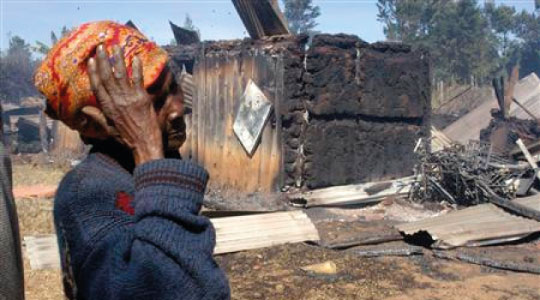WE TOLD THEM TO COME OUT OF THE CHURCH, BUT THEY LOCKED THE DOOR…SO WE BURNED THEM
This church in Eldoret, in terrifying circumstances, was no different. Sadly, 35 people, mostly babies, children and women, were brutally murdered in that church on that day. One of the youths who was later interviewed stated, “The men and women had babies and small children, but they carried pangas to defend themselves. Is someone with a panga innocent? It is not our custom to kill women and children. We told them to come out of the church, but they locked the door and refused to come out. So we burned them.” Another of the youths said, “They were not worshipping in the church. They were hiding. That makes it a cave not a church. Let Kibaki send a plane for the Kikuyus. They can go…or they will be killed.”

These very troubled and misled youth had it very wrong. Not only were their murders totally unjustifiable, but their idea of the church was also totally wrong. The Church is the Body of Christ. We are man- dated to love, care and support one another, even our enemies. We are to ‘bear one another’s burdens, and so fulfil the law of Christ’ (Gal. 6:2). The other thing we are commanded to do, by the Lord Jesus Himself, is to disciple one another. ‘Go therefore and make disciples of all the nations…teaching them to observe all the things I have commanded you…’ (Mat. 28:19). Several of these youths were homeless, orphaned, abused, and/or addicted to drugs. For a child who has suffered such hardship, it is easy to get carried away into some sort of collective purpose, no matter how evil. Two things are clear for the discerning Christian to see from this atrocity. Both speak of the problem, which has manifested itself here in this extreme way, but of course manifests itself in several diverse ways throughout society. The first is the need for the Body of Christ to provide loving care, safety and education to those most vulnerable in society – usually children and women (James 1:27; Isaiah 1:17; Psalm 82:3). The Church, specifically as an institution, is mentioned as Acts 2 as providing for the physical needs of fellow believers in need: ‘Now all who believed were together, and had all things in common, and sold their possessions and goods, and divided them among all, as anyone had need’ (Acts 2:44-45). Jesus’ heart for us is to love each other as ourselves, and to do to each other what we would also want done to ourselves (Mat. 22:39; 7:12). The second is the need for regular, personal, Christian discipleship for children, young adults and grown men and women. Discipleship involves teaching those who are becoming disciples of the Lord ‘…to observe all the things He has commanded us…’ (Mat. 28:20) Watching children grow up and not being ‘trained in the way they should go’ is heart-breaking. Watching adults stumble through life without ever receiving proper discipleship is just as heart-breaking. Discipleship needs to occur on a large scale, and it must involve biblical encourage- ment as well as biblical correction in equal measure. It must come from the Body of Christ, always being firmly rooted in a local church. Why is discipleship being rooted in a local church important? The answer comes directly from scripture: We are to regularly gather with other believers, (‘…not forsaking the assembling of ourselves together, as is the manner of some…’), to receive encouragement and to be accountable to other believers, (‘but exhorting one another…), and not only that, but we are commanded to do so: ‘so much the more as you see the Day approaching’ (Heb.10:25). Therefore, according to scripture, meeting corporately with other believers is non-negotiable for all believers, with those offering discipleship in parachurch ministries not being excluded, and the need to do so is only increasing, not decreasing. Why does such meeting together need to be primarily, though not exclusively, in a local church? The Bible gives instructions for the establishment of the God-given institution of the Church, under which believers are to gather. It also outlines certain functions to be carried out in the Church, such as the ordinances of communion and baptism. Such a local church is only a true church if it functions according to the six pillars of the Church outlined in scripture, namely having:
- Church leadership – Elders/Pastors/Deacons (Titus 1:5; Acts 20:28; 1 Timothy 3:1-13)
- Regular, corporate fellowship (Acts 2:41-42)
- Regular, corporate prayer (Acts 2:41-42)
- Regular, corporate teaching (continuing in the Word) (Acts 2:41-42)
- Regular, corporate holding of communion (Acts 2:41-42)
- Regular opportunity for baptism of believers (Acts 2:41-42)
This means we cannot attempt to ‘attend church’ or ‘do church’ isolated from other believers at home or at our humanitarian aid organisations. It also means we cannot attempt to carry out functions commanded in the Bible, such as discipleship, without any anchor in a local church. We must be rooted in a local church because we are to submit to church leader- ship, fellowship with other believers, pray with the Body of Christ, be taught and exhorted by God-given teachers, and be held accountable to the Church (Hebrews 13:17). This does not mean discipleship can only ever be exclusively carried out through a church ministerial department, but it does mean that if it is not lead by a local church, it must at least be done by those who are members of local churches. GCM ensures this is always the case. In summary, the ministry of GCM is set up to meet both the needs clearly highlighted by the above tragic story:
- The desperate need for loving care, safety and education among countless Africans, especially children and women; and
- The desperate need for proper, biblical discipleship to complement the loving care, safety and education provided to Africans in
- If the latter is done to the utmost degree, it should help reduce the need for the former to be done by the Church and other church-rooted organisations. GCM is set up to be an example to other churches and Christian organisations about how the Church is the ultimate God-given institution, and how all good-intentioned Christian ministry must be closely linked to it, submit to it, and ultimately, flow from it.

